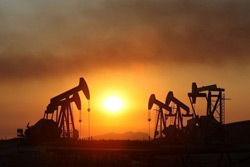 Reuters: Brent crude rose above $107 a barrel on Tuesday as fresh sanctions on Iran, and the prospect of possible military action, offset persistent worries about the health of Western economies and their fuel demand.
Reuters: Brent crude rose above $107 a barrel on Tuesday as fresh sanctions on Iran, and the prospect of possible military action, offset persistent worries about the health of Western economies and their fuel demand.
By Florence Tan
 SINGAPORE (Reuters) – Brent crude rose above $107 a barrel on Tuesday as fresh sanctions on Iran, and the prospect of possible military action, offset persistent worries about the health of Western economies and their fuel demand.
SINGAPORE (Reuters) – Brent crude rose above $107 a barrel on Tuesday as fresh sanctions on Iran, and the prospect of possible military action, offset persistent worries about the health of Western economies and their fuel demand.
The United States, Britain and Canada on Monday announced new sanctions on Iran’s energy and financial sectors, ratcheting up pressure on Tehran to stop its nuclear program.
Investors fear oil prices could spike in the event of air strikes on Iran’s nuclear sites, which could suddenly cut supply from OPEC’s second largest crude producer and disrupt trade in the Strait of Hormuz, the world’s most important oil transit channel.
The uncertainty helped bolster prices, under pressure from the worsening debt crisis in Europe and the United States that is expected to hurt economic growth and fuel demand. A decline in global oil demand may prompt the Organization of Petroleum Exporting Countries (OPEC) to tighten output at its December meeting, Iraq’s oil minister said.
ICE Brent January crude rose 37 cents to $107.25 a barrel by 0726 GMT, after falling for four consecutive sessions. Brent has risen 13 percent this year, and is set for a third annual gain.
U.S. January crude was up 40 cents to $97.32 a barrel, after three sessions of losses.
“Iran adds a risk premium to crude,” said Jonathan Barratt, managing director of Commodity Broking Services.
U.S. sanctions have already made it extremely difficult for many global oil companies and traders to obtain bank financing to trade Iranian crude, less than a third of which goes to Europe, with the rest flowing to China and India.
France has urged the European Union and other nations to immediately freeze the assets of Iran’s central bank and to suspend purchases of Iranian oil, steps it described as “sanctions on an unprecedented scale.”
Iran dismissed on Tuesday the new sanctions as more a propaganda exercise than something that will hit the economy while its deputy oil minister said any new U.S. sanctions would not stop Iran exporting petrochemicals to the European Union.
“Depending on how the issue escalates, we may see $150 crude which will have dramatic concerns especially as Western economies are trying to emerge from a slowdown,” Barratt said.
Washington-based energy consultancy Rapidan Group said a military conflict could cause oil prices to jump by $23 a barrel initially.
“Potentially massive price increases would follow in subsequent weeks, depending on whether the key Strait of Hormuz choke point is blocked and how officials respond,” it said in a research note.
The United Arab Emirates could start as early as end-December pumping oil via a key pipeline that will allow it to bypass the Strait of Hormuz and protect exports.
Escalating unrest in other Middle East nations Egypt and Syria also underpinned oil prices, analysts said.
EUROPE, U.S. DEBT
World equities took a hit on Monday as fears about the ability of politicians on either side of the Atlantic to tackle huge debt burdens sapped investors’ confidence in riskier assets.
A “super committee” of U.S. lawmakers failed to reach agreement on a deficit cutting plan while risk premiums on Spanish, Italian, French and Belgian government bonds rose as investors fled to safe-haven German Bunds.
“The big concern now is whether U.S. politicians will stall an economy that is starting to recover,” ANZ analysts, led by Mark Pervan, said in a note.
Barratt added: “There is a higher potential for a more aggressive slowdown in the United States and we’ve already got that concern in Europe.”
Even China’s economy faces growing risks from Europe’s sovereign debt crisis and from debt held by local Chinese governments, the World Bank said, but it could engineer a soft landing by easing monetary policy.
The American Petroleum Institute will release weekly oil data later on Tuesday which could show a fall in U.S. crude oil and distillate stocks last week while gasoline stockpiles rose, according to a Reuters survey of analysts.
(Editing by Miral Fahmy)


